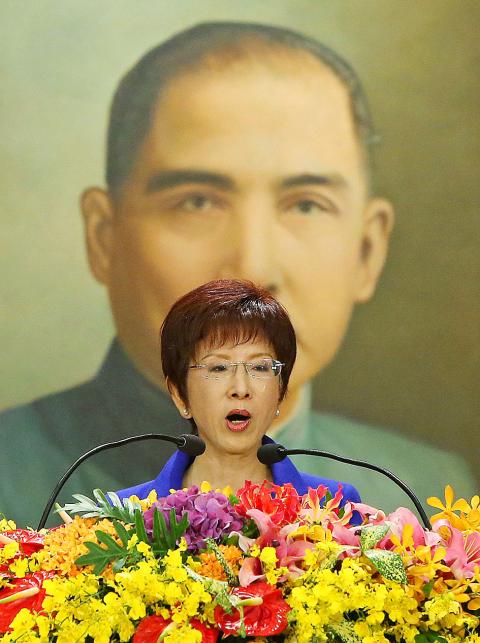The Chinese Nationalist Party (KMT) has called on members to pay “a special party fee” of NT$2,000 per person in order to “save [the party] from demise,” with KMT Chairwoman Hung Hsiu-chu (洪秀柱) said to be ready to pay her share tomorrow to set an example.
The KMT said it would launch events calling for the “special party fee” to protect its survival and a “NT$1,000 donation” drive on the eve of Retrocession Day on Tuesday “in order to defend the Republic of China’s (ROC) constitutional system of freedom, democracy and rule of law.”
Hung is to lead the party’s central leadership, city and county chapter officials and Huang Fu-hsing (黃復興) military veterans’ branch officials to pay the special party fees tomorrow while attending a “safeguard the ROC Constitution and donate NT$1,000” event that is to be held in New Taipei City tomorrow night, which is public-oriented, as opposed to the call for special party fees made to members.

PHOTO: CNA
The party said it hopes that members and the public can support the KMT to “hold out the hand of justice” and “check a Democratic Progressive Party [DPP] regime that is marching toward fascism and green terror.”
The special party fee has been set at a minimum of NT$2,000, although members can donate as much as they want, the party said.
Members who contribute during a stipulated period — from Tuesday through Dec. 25 — would receive a letter from the party chairwoman and a reprint of the certificate for the Revolutionary Party when it was founded by Sun Yat-sen (孫中山) in 1914 following the failed Second Revolution against Yuan Shikai (袁世凱) in 1913, “which is to symbolize the spirit of the [ROC’s] founding father in the Second Revolution by supporting the KMT in supervising an unjust and unconstitutional regime,” the KMT said.
Members of the public who participate in the NT$1,000 donation activity would be thanked with a reprint of the “receipt of the just pay of the Chinese Revolutionary Army” published by the Tongmenghui in 1911, a year before the founding of the ROC, which was issued so that revolutionary army soldiers could collect their pay.
It has been reported that some party workers have complained that the “special party fees” campaign calls for “reluctant donations” from party members, and have asked party headquarters to pay them their salaries before they donate.
KMT Culture and Communications Committee deputy director Hu Wen-chi (胡文琦) said that the event is simply an expression of the idea that the KMT can “save the party ourselves” and is not compulsory, adding that there would be no consequences for members who do not make contributions.
Additional Reporting by Shih Hsiao-kuang

Chinese Nationalist Party (KMT) Chairman Eric Chu (朱立倫), spokeswoman Yang Chih-yu (楊智伃) and Legislator Hsieh Lung-chieh (謝龍介) would be summoned by police for questioning for leading an illegal assembly on Thursday evening last week, Minister of the Interior Liu Shyh-fang (劉世芳) said today. The three KMT officials led an assembly outside the Taipei City Prosecutors’ Office, a restricted area where public assembly is not allowed, protesting the questioning of several KMT staff and searches of KMT headquarters and offices in a recall petition forgery case. Chu, Yang and Hsieh are all suspected of contravening the Assembly and Parade Act (集會遊行法) by holding

PRAISE: Japanese visitor Takashi Kubota said the Taiwanese temple architecture images showcased in the AI Art Gallery were the most impressive displays he saw Taiwan does not have an official pavilion at the World Expo in Osaka, Japan, because of its diplomatic predicament, but the government-backed Tech World pavilion is drawing interest with its unique recreations of works by Taiwanese artists. The pavilion features an artificial intelligence (AI)-based art gallery showcasing works of famous Taiwanese artists from the Japanese colonial period using innovative technologies. Among its main simulated displays are Eastern gouache paintings by Chen Chin (陳進), Lin Yu-shan (林玉山) and Kuo Hsueh-hu (郭雪湖), who were the three young Taiwanese painters selected for the East Asian Painting exhibition in 1927. Gouache is a water-based

Taiwan would welcome the return of Honduras as a diplomatic ally if its next president decides to make such a move, Minister of Foreign Affairs Lin Chia-lung (林佳龍) said yesterday. “Of course, we would welcome Honduras if they want to restore diplomatic ties with Taiwan after their elections,” Lin said at a meeting of the legislature’s Foreign Affairs and National Defense Committee, when asked to comment on statements made by two of the three Honduran presidential candidates during the presidential campaign in the Central American country. Taiwan is paying close attention to the region as a whole in the wake of a

OFF-TARGET: More than 30,000 participants were expected to take part in the Games next month, but only 6,550 foreign and 19,400 Taiwanese athletes have registered Taipei city councilors yesterday blasted the organizers of next month’s World Masters Games over sudden timetable and venue changes, which they said have caused thousands of participants to back out of the international sporting event, among other organizational issues. They also cited visa delays and political interference by China as reasons many foreign athletes are requesting refunds for the event, to be held from May 17 to 30. Jointly organized by the Taipei and New Taipei City governments, the games have been rocked by numerous controversies since preparations began in 2020. Taipei City Councilor Lin Yen-feng (林延鳳) said yesterday that new measures by